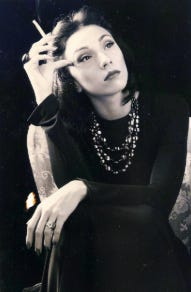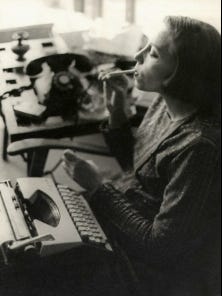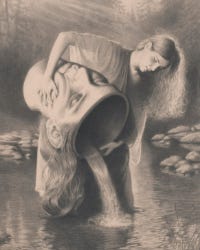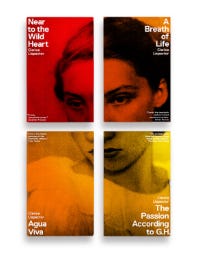The past two weeks, I experienced a serious bout of writer’s block. The idea of writing and planning my next Substack article, which had been exciting until now, became daunting and stressful; it felt as if someone had taken hold of my brain and shaken it violently until it was a barren thing, with no thoughts or ideas emerging from an otherwise creative stream. I became frustrated and decided I needed to take a week off from writing to strictly read and consume words instead of producing them. Surely that would do the trick, and by next week, with the grace of all the reading and the words I had filled my brain with, the writing I wanted to produce would effortlessly fall out of me.
“Read A Thousand Books And Your Words Will Flow Like A River.” - Virginia Woolf
But the next week arrived, and still, when I sat down to write, only but a few words transpired onto the page, I would write a few words of substance but couldn’t get myself back in my usual writing flow and feelings of defeat followed by a series of distressing questions rose to the forefront of my conciousness, Would I be without words in this way forever? Why is it so easy to consume words, but so difficult to produce them? Why is it so difficult to find the words to convey the thoughts and intuitive inklings that pass through my body and brain? I wasn’t about to let those questions become my permanent reality. I would spend one more week reading, and it was during this second week of reading that I would get my hands on Água Viva (The Stream Of Life) by Clarice Lispector.
“Freedom? It is my final refuge, I forced myself to freedom and I bear it not like a talent but with heroism: I am heroically free. And I want the flow.” - Clarice Lispector.
The first book I read by this Ukrainian-born Brazilian novelist was The Hour Of The Star. Three years ago, to be exact, on my iPhone, I read it all in the span of a day, and while I was moved by it, I don’t think I was yet able to realize the literary genius I had just encountered.
Fast-forward three years. I’m now on Substack, hearing through the grapevine how impressive Lispector's work is. So, during that second week of my writer's block, I stumbled upon Áqua Viva in a bookstore, grabbed my copy, and happily announced my purchase. What follows are comments beneath my announcement from others claiming…
“This book changed the way I write”
and…
“This book rewired my brain!”
A feeling of both intimidation and excitement follows me closely as I open the first pages of Áqua Viva, transporting me into a world where writing is meant to be felt, like music and visual art- a world where language is pushed beyond its limits. Here, the jumping-off point is intuition, and the dive plunges into waters mixed with the magic of the immediate present, the Is, and the subconscious that lurks just beneath the surface of each word's meaning, forever pulling the strings of our immediate experiences. I find it almost impossible to describe Lispector’s work; metaphors barely suffice because her writing is meant to be felt and experienced individually.
“The world has no visible order, and all I have is the order of my breath. I let myself happen.” - Clarice Lispector
Stream-Of-Consciousness Writing
In Áqua Viva, Lispector masters stream-of-consciousness writing through the novel’s central theme, focusing on the pursuit of immediate experience beyond structured thought. She mimics the way consciousness moves abruptly and unpredictably from one thought and perception to another, making this 80-page book easy to finish in a day or just a few hours. The prose moves quickly, pulling your attention in a hundred different directions while simultaneously engaging it. Lispector paints vivid imagery in one moment, only to pull the reader back into contemplative introspection the next.
After finishing the book, I had a revelation: too much of my recent writing felt overly structured and formulaic. I won’t lie, like with most social media (Substack isn’t an exception), I found myself forcing my writing to align with what the algorithm preferred and what others wanted to read, rather than focusing on what I truly wanted to express. I don’t think there’s anything wrong with more formulaic and structured writing. Hell, I love to write essays; it’s how I got into writing. Placing my thoughts into a structured Introduction, body, and conclusion feels satisfying to my brain, almost mathematical.
Yet, creative writing calls for something deeper, something unstructured; it calls for explosions of impulse, insight, and intuition. It calls for your writing to come from YOU, and this is what stream-of-consciousness allows for a more fluid and raw exploration of thought and experience. By breaking from linearity, it mirrors the fluidity of memory and emotion, creating a more immersive and sometimes unsettling but necessary reading and writing experience. In a world that often prioritizes clarity and order, stream-of-consciousness reminds us that human experience is messy, contradictory, and beautifully fragmented. It’s a form of literary rebellion, a way of capturing the uncapturable.
I now realize the importance of practicing this kind of writing. I discovered a cure for my writer's block: twenty minutes of stream-of-consciousness journaling every morning upon waking, or morning pages, as Julia Cameron, author of The Artist’s Way, likes to call them. Additionally, reading the works of writers such as Lispector, whose writing breaks the norms and barriers of what we are used to, helps me get accustomed to writing in that mode by engaging with it.
I’ve been saving Virginia Woolf’s writing for a long time. I’ve encountered it on numerous occasions over the years and even have a book the size of my head filled with all her collected writings; however, I have never opened it. The reason is that I found stream-of-consciousness writing intimidating and daunting. I doubted my attention span would allow me to engage with it. But now, upon discovering Lispector, I realize this style of writing is not as daunting as I originally believed; it operates on a deeper level and evokes different feelings and sensations compared to other forms of writing. It establishes a visceral connection to the writers and characters, who come to life on the page alike.
“Consciousness... does not appear to itself chopped up in bits. Such words as 'chain' or 'train' do not describe it fitly as it presents itself in the first instance. It is nothing jointed; it flows. A 'river' or a 'stream' are the metaphors by which it is most naturally described. In talking of it hereafter, let us call it the stream of thought, of consciousness, or of subjective life. Source of the expression 'stream of consciousness” - William James






So thoughtful and beautifully written! I think I’ll be joining you in the 20 minute stream of consciousness writing. I also find changing settings helps immensely (basic, I know) but it gives you a muse to work with; whether it’s a willow tree, an old café, or a fishing boat, having physical inspiration will bring out details that transcend imagination.
i think the fact Lispector has no formal training in literature and adorns that detail makes her writing even more lovable